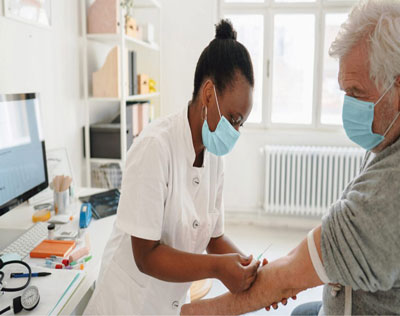The production of antibodies is a key immune re-sponse to viruses, bacteria or other pathogens, but it’s not the body’s only way of fighting infection.
Booster doses are seen as a way to shore up the immune protection against SARS-CoV-2, the coro-navirus that causes COVID-19. More countries are rolling out boosters in the face of the Omicron vari-ant, which can overcome some of the protection offered by vaccines.
As more countries roll out booster doses of COVID-19 vaccines, conversations over how well these additional doses will protect people have centered on three things — breakthrough infections, waning antibody levels, and highly transmissible variants such as Delta and Omicron.
The concern is that as antibody levels decline during the months after full vaccination, people will be less protected, especially from the highly contagious Delta and Omicron variants, which could increase breakthrough infections.
In addition, preliminary data suggests that Omicron may be able to overcome some of the immune protection offered by vaccines and prior infection. Booster doses are seen as a way to shore up immune protection against SARS-CoV-2, the coronavirus that causes COVID-19. However, the booster shot debate is more complicated than this.
When talking about how well COVID-19 vaccines work over time, there’s not only one type of effec-tiveness. Some vaccines might still prevent most people from getting severely ill or dying but may have less protection against infection that leads to minor symptoms.
In addition, antibodies are only one tool used by the immune system to fight infection. Focusing solely on antibody levels misses the protection offered by the other parts of the immune system, some of it longer-lived.
Still, it’s important to understand how antibodies work and what waning levels might mean for protection against COVID-19.
Antibodies are Y-shaped proteins the immune system produces in response to an infection. They recognize and bind to specific molecular structures — known as antigens — such as those found on the surface of a virus or bacterium.
Many of the antibodies involved in preventing coronavirus infection bind to the virus’s spike protein on the surface, which the virus uses to infect cells.
Antibodies are produced by immune cells called B cells, found in the blood, lymph nodes, spleen, and other tissues. Each B cell produces a specific type of antibody.
Scientists estimateTrusted Source that the human immune system can produce at least a trillion unique antibodies, although it could be substantially higher.
When the body encounters a virus or other pathogen for the first time, and a B cell can bind to that pathogen, the B cell is activated.










